Eco Trends & Innovations
8 mins read
Revamp Festival Dispatch: Building Consciousness and Community in African Fashion
By Sybil Fekurumoh
September 15, 2025
At MADhouse Lagos, Revamp Festival explored circular fashion, creativity, and wellness for a conscious future in African fashion.
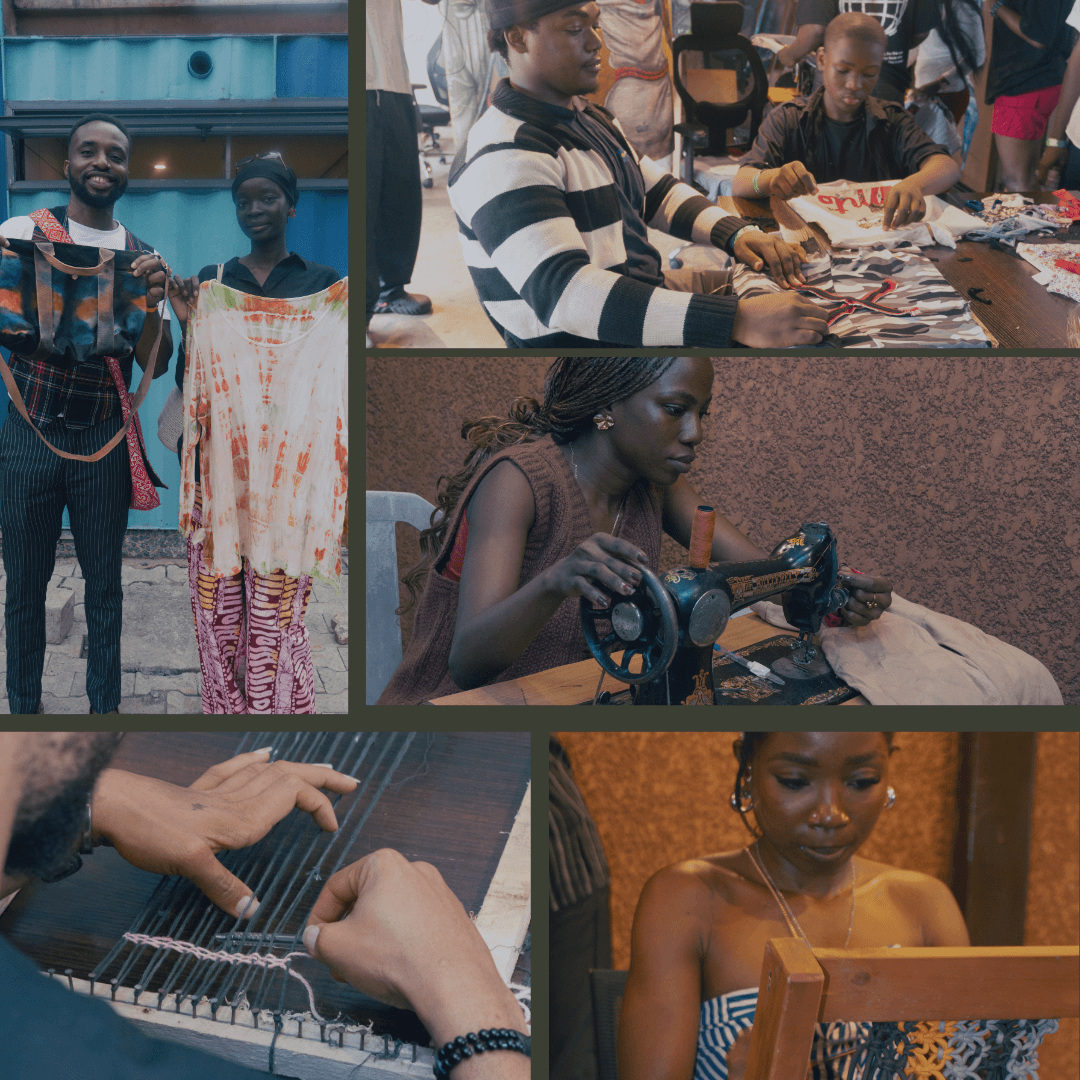
The different workshops - weaving, tie and dye, macramé, art canvas, and patchwork - were the main highlight of the Revamp Festival
What does it mean to build a circular fashion system? How do we achieve this, as producers and consumers? As fashion stakeholders, how do we reconcile fashion, creativity, and sustainability? These were the questions the 2025 Revamp Festival sought to answer during its panel session.
But that’s only one part of the interactive and spirited event. The joint-partnered event between Oluwaseun Oyedele, textile designer and founder of Seun’dele and Revamp Festival, and MADhouse Lagos, where the event was held, also offered workshops and wellness activities. The festival was a seeming “daycation” for attendees to create, learn, and reflect.
Revamp Festival has a running ethos: to reclaim African eco-consciousness in an era of fashion linearity. To encourage circular systems for cultural preservation and to set a precedent for contemporary fashion. A system where upcycling can be tranquil and community-driven, and restoration is a channel for creativity and self-expression.
As Oyedele shared, “Sustainability starts with a consciousness. [But] that shift doesn’t have to be boring; it can be creative, stylish, cool and true to our culture. We also believe wellness and sustainability go hand in hand because how we care for the earth reflects how we care for ourselves. A sustainable world begins with well people: rested, conscious, and whole.”
The goal was to make the sustainable fashion movement edgy and approachable, while also creating more awareness about the environment without leaving the audience feeling agitated. But did Revamp Festival achieve its set out undertaking, and did the attendees take away energised and optimistic about the future of African fashion?
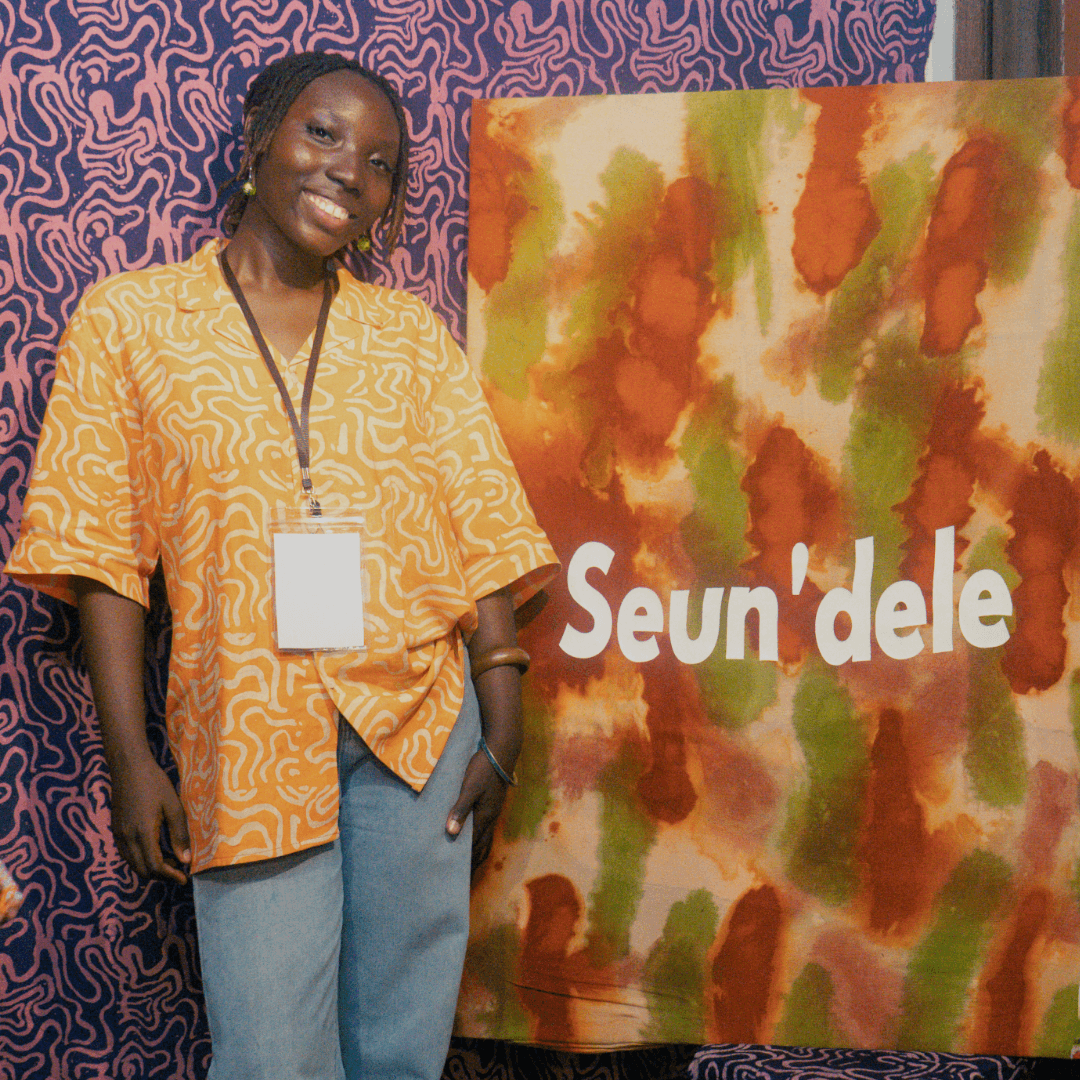
Oluwaseun Oyedele is a textile designer and the founder of Seun’dele | Revamp Festival.
The selected venue itself embodied the festival’s themes. MADhouse Lagos, operational since 2023, is a hub of culture, collaboration, and creativity. The halls are decked with artworks that reflect sustainability and heritage, whether it is in the materials used – think Adire as canvas – or in themes the art represents. One such piece, Adedotun Oluwadarasimi’s The Last Night, layers a solitary face in shifting hues of blue. It captures a fleeting reverie, forever engraved in memory, and inviting the observer to reflect on times past — a time of more eco-consciousness, perhaps.
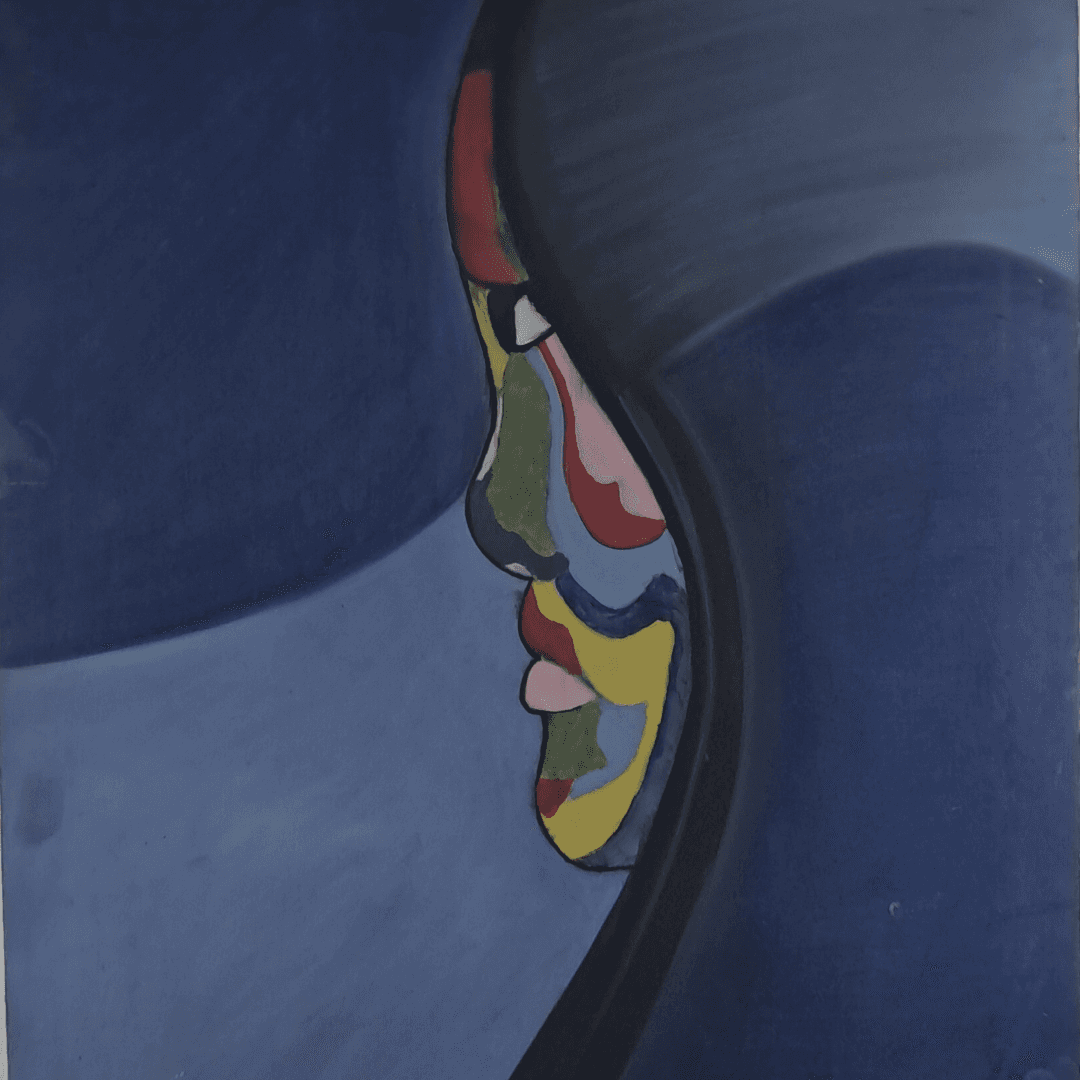
The Last Night (2025) by Adedotun Oluwadarasimi. Acrylic on canvas | Threadit.
But to merely focus on the aesthetic of the venue is a digression, and to fully appreciate the execution of the event is to look at its line of activities. The panel session, moderated by Oyedele herself, had for its speakers Agosu Moses, fashion entrepreneur and creator of Mak Africa; Omolabake Anyebe of Labake Lagos; fashion curator Lotanna Onyekwelu; and director and founder of WIT Studios, Tise Aro. As Oyedele would reveal later to Threadit, the lineup was selected with a focus on bridging the gap between consumers and producers, so that speakers could expand conversations around sustainability in fashion, both from a creator and consumer point of view.
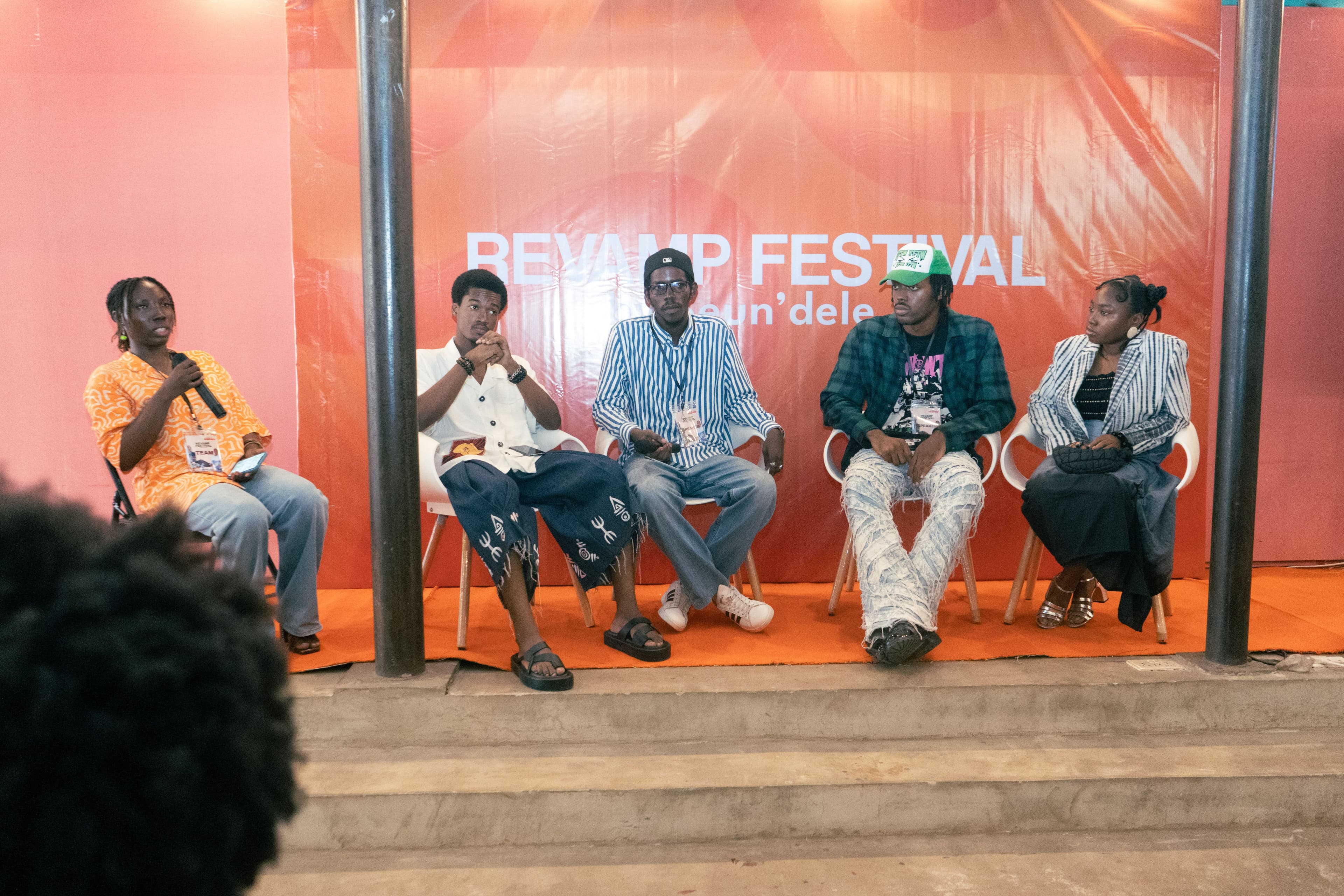
L-R: Oluwaseun Oyedele, Agosu Moses, Tise Aro, Lotanna Onyekwelu, and Omolabake Anyebe | Revamp Festival.
True to this premise, the speakers addressed the present state of the fashion industry and how designers can continue to stay relevant through storytelling and staying true to their values. The usual suspects for the fashion industry, or any industry, are still ever-present, such as logistics, sourcing raw materials, labour costs, etc., especially for small-scale producers.
One effective system that was highlighted was to streamline the production process to the most viable option. Moses revealed how he had to focus on only a few products at the beginning. As he shared, “Having multiple designs as a start-up business would be difficult to scale. Especially here in Nigeria, because of our inconsistent supply, both of labour and of your material resources that go into your production.”
One under-examined tension was this: streamlining production to scale can speed turnover, but in doing so, it risks mechanising, even industrialising, craft-based processes, which would undermine the very principles of slow fashion. That, ultimately, was the panel’s weakness: despite strong debate on authenticity and market fit, “true sustainability” remained undefined, and no clear metrics were offered to measure it.
However, one firm ground came in the agreement that core values like longevity and quality are non-negotiable. But what better summed up the sustainability was Onyekwelu’s words on waste management at different stages of production.
It is after these considerations that brands can agree that they have added value. “Look at your product lifecycle,” he said, “How much raw material are you putting in? How many of those finished products are being put back into production? Think of the value chain and consider how much waste you can eliminate, and how much you can recycle.”
The panel also tilted toward producers over consumers, and dwelt on the industry’s present, with little insight for its future. Anyebe dabbled in the subject, albeit briefly, discussing how she’s inspiring consumers to actively take sustainable actions with fashion. Such as with her brand, Labake Lagos, offering clothing repair services that encourage buyers to mend rather than discard. As she revealed, choosing quality material is important to encourage recycling, because “You can't upcycle what wasn't even created to last in the first place.”
These were insightful takeaways, but it was the workshops that carried the heft of the sustainability promise. The participants themselves already seemed attuned to the ethos of the event, with young people whose confidence radiates in both their styling choices and their demeanour.
To an observer, this lineup of art and fashion enthusiasts may make the event come off as exclusionary to only sustainable fashion supporters, but all that was needed was will and curiosity, as facilitators intently guided amateurs through weaving, patchwork, tie-dye, macramé, and art canvas sessions.
The choice of instructors for Revamp Festival was selected to bring together the diversity of the textile industry. These were skilled creators who took sustainable actions in their fields, while also sparking important conversations about ethical fashion. This included Oyedele, who facilitated the tie-and-dye session, Chibuzor/Craftandthelady for macramé, and Godwin Ajeseni for art canvas.
With the latter, participants layered cut fabrics on a canvas and painted on them, which the instructor also admitted is novel and experimental, especially for amateur artists. “It was nice to see non-artists work on something they’ve probably never done before; merging, upcycling, painting. It was very good to see people create freely,” said Ajeseni.

Top left to bottom right: The workshop facilitators - Oluwaseun Oyedele, Khadija Dikko, Chibuzor/Craftandthelady, Aladimma Uche, and Godwin Ajeseni | Revamp Festival.
Khadija Dikko, who facilitated the weaving class, is a multidisciplinary textile designer. She creates handwoven textiles, using photography, drawing, and painting, all as channels for cultural storytelling. Dikko described her class as challenging, exciting, and enlightening. And rightly so, as weaving requires patience and concentration. “If you are weaving for the first time, it takes a while to ease into it…” she shared. She paid rapt attention, demonstrating how to attach yarn and improvising pens as shuttles to pass through the loom. “It is still learning at the end of the day.”
Aladimma Uche, the creative director of the denim upcycling fashion brand AZACH, who facilitated the patchwork session, wanted his students to leave his class with a mind reset. “Coming here with your old clothes and leaving with something different changes your mindset.” Heavily invested in upcycled fashion, AZACH revamps old denim into stylish outfits, and during his workshop at Revamp Festival, his students traded scraps of fabric, creating new items like tote bags.
The ambience, panel, and workshops set the tone and pacing for collaboration and learning about sustainable fashion. But the two wellness sessions further solidified the event as a holistic experience, where attendees left feeling recharged and enlightened. The timing of the sessions was also fitting. The first one by Àrà by ÀÁDÙN, as if to start the event on a positive mindset, and a late-day pilates session to set the audience off in introspection.
For Oyedele, small conscious steps can lead to big changes, and if those steps are taken in a relaxed environment, that’s already a win. “We want attendees to leave feeling lighter and brighter, lives changed, burdens lifted, and a renewed sense of hope to carry forward,” she would later say.
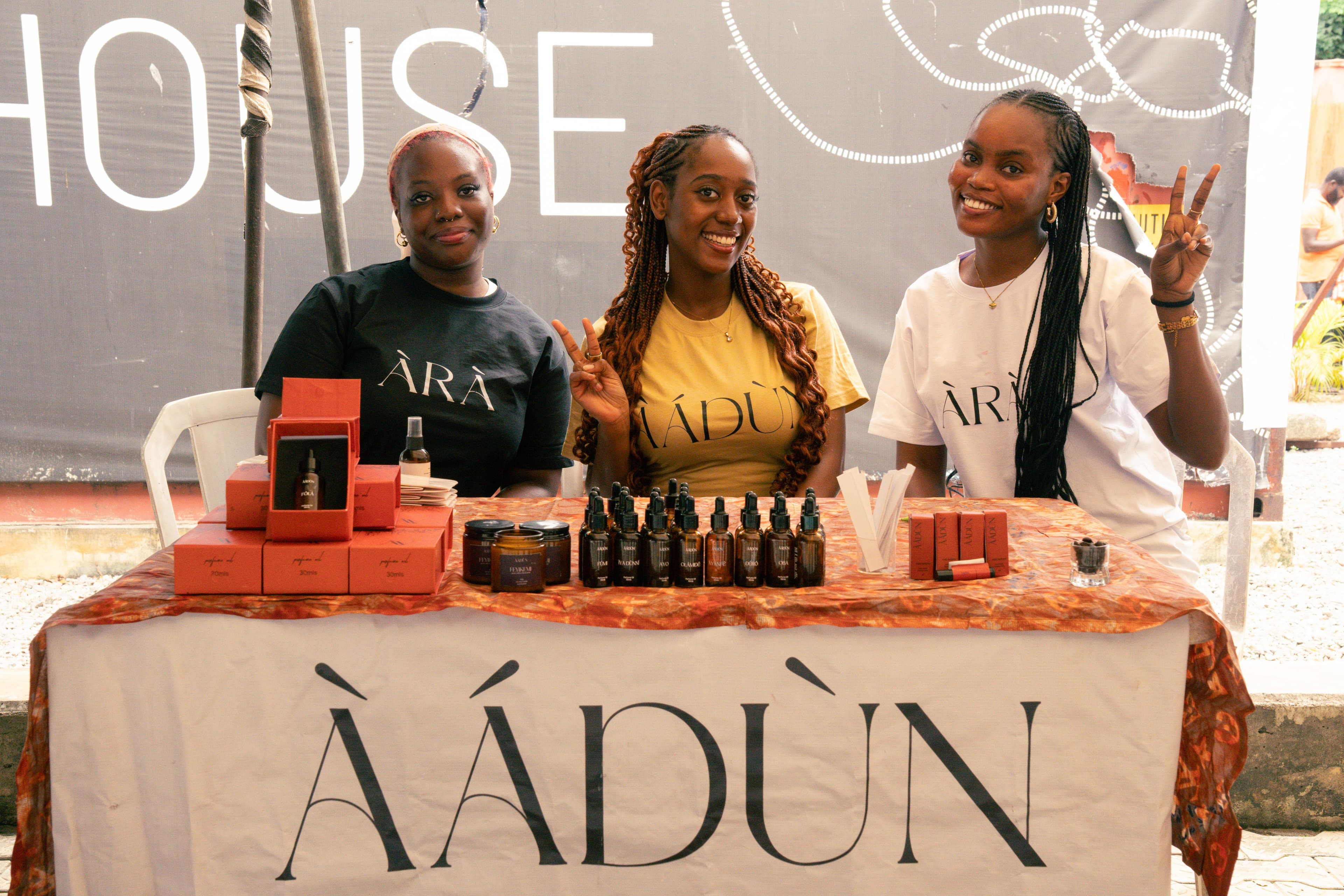
ÀÁDÙN was one of the partners at the festival, and they set up a stand outside of the event | Revamp Festival.
Seun’dele and MADhouse set out to promote sustainability and relaxation, ensuring their guest could unwind, if not for the whole day, at least for a few hours. The line of collaborators proved that there was care with planning and presentation for the Revamp Festival. The collaborators, one of whom was the 2K wardrobe, which organised a clothes swap at the event, ensured in their distinct ways that the message of revamping and conscious living spreads beyond the event.
The convener, Shalom Akanbi, also part of the Seun’dele team, carried the crowd along with warmth and energy, ensuring the sessions stayed engaging and inclusive.
As Akanbi puts it, “The next generation is stepping into a world already overwhelmed with waste and excess. Their role is to recognise this and choose differently, to reuse, revamp, and reinvent rather than throw away and buy new for every occasion. There are so many creative ways to do this, especially here in Africa.”
Revamp Festival proved that sustainability can be practical and community-driven, while remaining stylish. The future of African fashion lies in eco-conscious values that we would collectively emulate.
As Oyedele aptly surmised, “If there’s one thing we’d love every attendee to take away from Revamp Fest, it’s that sustainability begins with each of us... We hope the experience sparks a deeper environmental consciousness and inspires conscious living.”
Like Post
Comments
No comments yet. Be the first to comment!
Related Posts
MoreHow to Declutter Your Closet in Five Easy Steps
We’ve outlined five simple steps to declutter your wardrobe and embrace more sustainable fashion choices, helping you let go of clothes you no longer need.
Crocheting 101: Can We Outrun Fast Fashion Through Crocheting?
Learn how to make sustainable choices with crochet and discover whether crochet can truly outrun fast fashion.
Interview: Summer Chiamaka Anyanwu on Winning the Maiden Edition of Miss Green Fashion
Meet Summer Anyanwu, the Miss Green Fashion Queen, redefining sustainable fashion in Africa through purpose, leadership, and circular textile solutions.
Rita Idehai, on Waste, Work, and Driving Social Impact in Nigeria
Through Ecobarter and its fashion arm, Wrep, Rita Idehai is transforming plastic waste into fabric, and creating new pathways for women and communities to thrive.